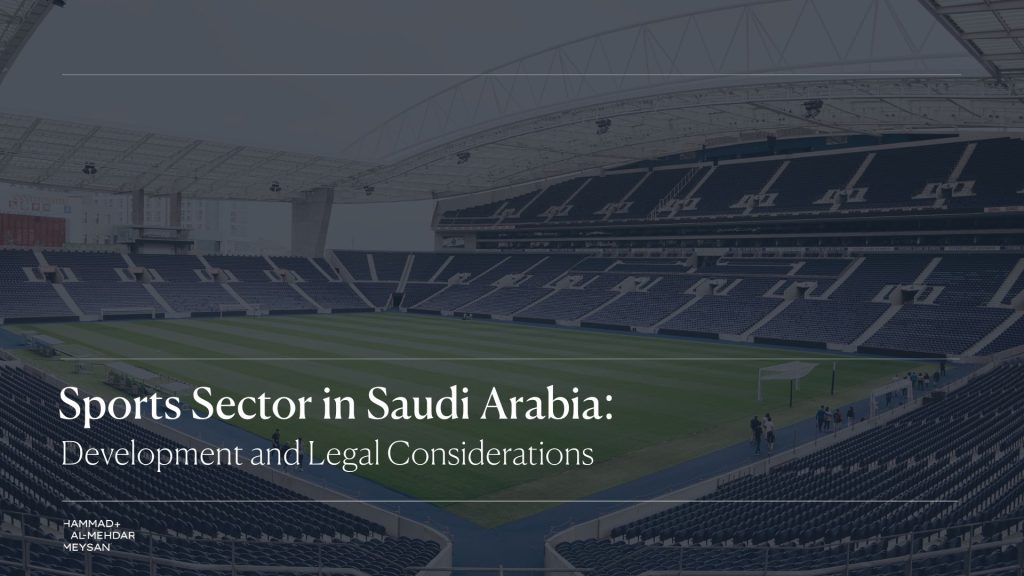
Over the past decade, Saudi Arabia’s sports sector has experienced a profound transformation, emerging as a central pillar of the Kingdom’s Vision 2030 goals. Driven by ambitious government strategies to diversify the economy, promote social well-being, and elevate Saudi Arabia’s international stature, sport has become a dynamic industry attracting massive investments and wide public engagement. This article reviews the sector’s evolution, highlights recent key developments, and examines the critical legal considerations shaping its future trajectory.
Transformational Growth Under Vision 2030
Vision 2030 explicitly positions sports as a catalyst for national development, emphasizing its role in enhancing quality of life, stimulating private sector investment, and improving Saudi Arabia’s global image. The Ministry of Sport, established in 2016, has spearheaded efforts to create an inclusive, competitive, and commercially sustainable sports ecosystem.
Saudi Arabia has invested heavily in state-of-the-art infrastructure and sport-specific facilities, supporting national federations and enabling the hosting of numerous world-class international events. Notable recent highlights include the Dakar Rally, Formula E and Formula One Grand Prix, WWE shows, high-profile boxing matches, and the Saudi Cup, the world’s richest horse race. Looking ahead, the Kingdom is preparing to host the 2027 AFC Asian Cup and remains a strong contender to co-host the 2034 FIFA World Cup.
At the grassroots level, initiatives like the Quality-of-Life Programme and Saudi Sports for All Federation have dramatically increased public sports participation, especially among women and youth. Enhanced support for community clubs, school sports programs, and talent development academies underscores a commitment to sustainable growth and social inclusion.
Private Sector and Investment Dynamics
The growing role of the private sector is a key driver of the sports industry’s rapid development. Saudi Arabia’s Privatisation Programme aims to transfer ownership and management of various sports clubs and facilities to private entities, boosting efficiency, innovation, and profitability.
The Public Investment Fund (PIF) remains a central player on the global stage, with high-profile acquisitions such as the 2021 takeover of Newcastle United Football Club highlighting Saudi Arabia’s expanding sports footprint. PIF’s investments have also extended to LIV Golf, motorsports, esports, and combat sports, reflecting a diversified portfolio designed to build influence and expertise.
These global ventures attract world-class talent, sponsorships, and know-how, while fostering domestic capabilities and generating economic returns. However, the increasing international presence demands enhanced governance and transparency.
Legal and Regulatory Framework
To support this growth, Saudi Arabia has strengthened its legal and regulatory infrastructure, aligning domestic sports law with global best practices. The establishment of the Saudi Sports Arbitration Centre has introduced independent, specialised dispute resolution for sports-related conflicts, enhancing confidence among stakeholders.
Recent regulatory reforms have addressed club ownership structures, player contracts, anti-doping enforcement, broadcasting rights, sponsorship agreements, and intellectual property protection. This comprehensive framework aims to safeguard integrity, encourage commercial investment, and foster cross-border collaborations.
Sports law is now recognised as a specialised discipline within Saudi legal education, with universities and institutions offering dedicated programs to prepare practitioners for the complexities of modern sports governance.
As Saudi Arabia deepens its involvement with international bodies such as FIFA, the International Olympic Committee (IOC), and the World Anti-Doping Agency (WADA), compliance with global standards concerning human rights, transparency, and ethical conduct becomes paramount.
Socio-Cultural Impact and Inclusion
Sport’s societal impact in Saudi Arabia has been transformative, particularly regarding gender inclusion. Women’s participation in sports has expanded rapidly, with the formation of female leagues, national teams, and leadership roles in sports organisations reflecting broader social reforms.
Sports serve as a platform for community building, youth engagement, and national pride. Government-backed programs promoting sports tourism, mass participation, and inclusive events contribute to public health, social cohesion, and cultural exchange.
Challenges and Future Outlook
Despite remarkable progress, challenges remain. Sustaining grassroots development, building professional leagues, and maintaining Saudi Arabia’s international credibility require ongoing efforts. The legal and governance frameworks must adapt swiftly to emerging issues such as digital sports, esports regulation, intellectual property enforcement, and anti-corruption measures.
Heightened global scrutiny of Saudi sports ventures necessitates balancing domestic priorities with international expectations, particularly on human rights and ethical governance.
Looking forward, priorities will include nurturing talent pipelines, enhancing fan engagement, and integrating cutting-edge technologies like AI, data analytics, and immersive digital platforms. Continued strategic investments combined with responsive policy and legal reforms position Saudi Arabia to become a global sports powerhouse.
The sports sector in Saudi Arabia is undergoing a historic and multifaceted transformation that aligns ambition with opportunity. Supported by visionary government policies, substantial investment, and a rapidly evolving legal landscape, the Kingdom is charting a dynamic course toward regional and global sports leadership. Success will depend on maintaining a delicate balance between growth, integrity, inclusivity, and global standards—ensuring a sustainable and credible future for Saudi sports.
